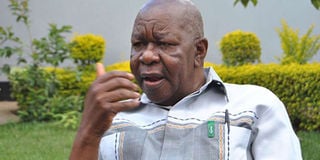Francis Imbuga: The making of a storyteller

Playwright Francis Imbuga is interviewed at his Nairobi home on November 5, 2012. When he was growing up, he was fascinated by songs and old stories. PHOTO | FILE | NATION MEDIA GROUP
What you need to know:
- Imbuga preferred pubs and restaurants, arguing those are the places where real humanity was lived and expressed.
- And like many successful authors, Imbuga had his manuscripts rejected at the publisher’s reception many times before he finally cracked it in 1972.
Born to a World War II veteran, Prof Francis Imbuga grew up listening to and telling stories, especially with his grandfather Mugodo in Chavakali.
The young Imbuga was fascinated by songs and old stories, especially the myths he heard from older people.
His grandfather had a traditional musical instrument, a litungu, which he often played and to which Imbuga loved to dance.
It is through this interaction that Imbuga’s creative side was nurtured, according to a new biography, Francis Imbuga: The Cherished Footprints, by Masinde Kusimba, and the latest from the Bookmark Africa stable.
The 16-chapter book gives a detailed account of the life of a man who is arguably the best playwright in East and Central Africa.
It says that Imbuga’s keen interest in human, social, cultural and political phenomena distinguished him as a master raconteur.
He always had a sheaf of cards on which he scribbled his observations.
SATIRE
Imbuga preferred pubs and restaurants, arguing those are the places where real humanity was lived and expressed.
As a result, most of his protagonists are ordinary citizens struggling to survive despite the oppressive circumstances of their societies, often caused by business and political elite.
His books focus on tribalism, integrity, repressive leadership, impunity, governance, women’s rights and the negative effects of modernisation on the social and moral fabric of society.
Maybe his humble beginnings in Nairobi’s Eastlands, where he was not assured of his next meal, had a major impact on the way he viewed life.
He used and explored satire in his highly critical plays to drive the message home.
In 1997, when President Daniel arap Moi was still in office, Imbuga and his colleague David Mulwa were asked by the vice-chancellor of Kenyatta University College to write a play to welcome the Head of State to the campus.
CRITICISM
They titled it Fuata Nyayo (follow in the footsteps), based on Moi’s clarion call. Ironically, the play was about a bad leader who had lost touch with his subjects
In the play, the seer tells the leader, “Look out there, what do you see?” The leader replied, “I see nothing.”
“Look carefully, what do you see?” the seer askes again, upon which the leader replies, “Oh, I can see the footsteps!” “Then follow the footsteps! Fuata nyayo …” the seer commands, sending everyone, including President Moi, into peals of laughter.
This is also found in his 1976 classic, Betrayal in the City, where the character Mulili is an incorrigible, sleazy and inept government official with a poor grasp of English.
CURRICULUM
It has been used as a set book in Kenya and other countries.
And like many successful authors, Imbuga had his manuscripts rejected at the publisher’s reception many times before he finally cracked it in 1972, when his two plays, Fourth Trial and Kisses of Fate, were published.
Thereafter, he authored more than a dozen titles, including The Married Bachelor (1973), Betrayal in the City (1976), Game of Silence (1977), The Successor (1979), Man of Kafira (1984), Aminata (1988), The Burning of Rags (1989), Shrine of Tears (1992), Return of Mgofu (2011).




